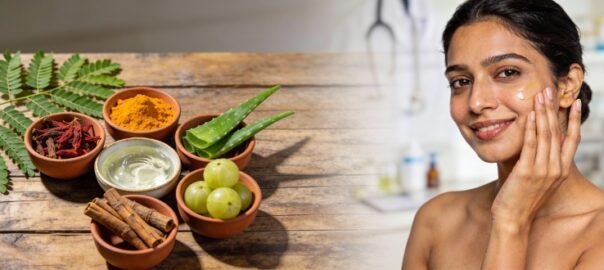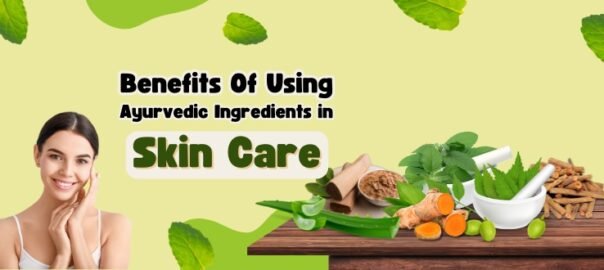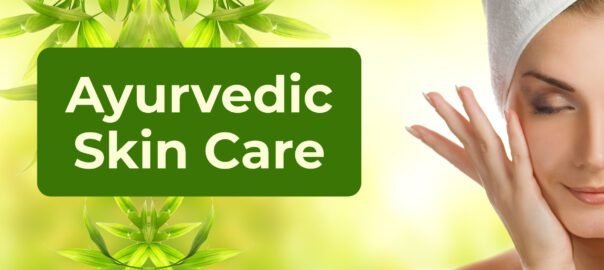Skin problems like acne, pigmentation, itching, dryness, eczema, and chronic rashes are no longer limited to teenagers—they affect people of all ages today. When searching for safe and sustainable solutions, many people turn to Ayurvedic treatment for skin problems because it focuses on root-cause healing rather than temporary suppression.
Unlike chemical-based treatments, Ayurvedic medicine for skin problems works internally by balancing digestion, detoxifying the blood, and improving immunity—making it a reliable natural treatment for skin problems in Ayurveda.
Why Ayurvedic Treatment for Skin Problems Works Long-Term
How Ayurveda Treats Skin Problems from the Root Cause
Ayurveda believes skin health is a reflection of internal balance. Most skin disorders occur due to:
- Impure blood (Rakta Dushti)
- Poor digestion (weak Agni)
- Hormonal imbalance
- Excess toxins (Ama)
- Stress & lifestyle habits
Instead of focusing only on visible symptoms, skin problems treatment in Ayurveda corrects internal imbalances, ensuring long-term relief.
Can Ayurveda Cure Skin Problems Permanently?
This is one of the most searched long-tail queries.
Ayurveda doesn’t offer overnight results—but it offers long-term Ayurvedic treatment for skin disorders by:
- Detoxifying the body naturally
- Correcting digestion & metabolism
- Strengthening immunity
- Supporting hormonal balance
With consistency and the right formulation, many people experience lasting improvement without side effects.
Best Ayurvedic Herbs Used in Skin Treatment
Neem for Skin Problems
Neem is a powerful blood purifier known for its antibacterial and antifungal properties.
It helps in:
- Acne & pimples
- Itching & rashes
- Fungal infections
👉 Widely used in Ayurvedic skin treatment products.
Manjistha Benefits for Skin
Manjistha is one of the best herbs for:
- Pigmentation
- Dark spots
- Chronic skin inflammation
It improves blood circulation and promotes clear skin from within.
Turmeric for Skin Healing
Turmeric is a natural anti-inflammatory and antioxidant herb that helps:
- Reduce acne scars
- Control redness & swelling
- Improve overall skin tone
It plays a key role in herbal treatment for skin diseases.
Aloe Vera Ayurvedic Skin Treatment
Aloe vera soothes irritated skin and supports hydration.
Helpful for:
- Dry & sensitive skin
- Sun damage
- Mild eczema
Amla for Skin Health
Rich in Vitamin C, Amla:
- Improves skin glow
- Delays aging
- Boosts collagen naturally
A common ingredient in Ayurvedic capsules for skin problems.
Guduchi (Giloy) for Skin Disease
Guduchi strengthens immunity and helps with:
- Recurrent skin infections
- Allergic reactions
- Chronic skin disorders
Read More: https://rigilhealthcare.com/top-5-ayurvedic-herbs-to-improve-skin-health/
Ayurvedic Treatment for Common Skin Problems
Ayurvedic Treatment for Acne and Pimples
Ayurveda treats acne by:
- Balancing Pitta dosha
- Purifying blood
- Improving digestion
Best herbs: Neem, Manjistha, Turmeric, Amla
Ayurvedic Treatment for Pigmentation & Dark Spots
Pigmentation is often linked to hormonal imbalance and liver health.
Ayurvedic solutions include:
- Detox herbs
- Cooling formulations
- Lifestyle corrections
Ayurvedic Treatment for Eczema & Itching
For eczema and itchy skin, Ayurveda focuses on:
- Reducing inflammation
- Healing the skin barrier
- Preventing recurrence
Herbal remedies for itchy skin are preferred for long-term safety.
Ayurvedic Treatment for Psoriasis & Chronic Skin Diseases
Psoriasis and chronic skin disorders require long-term Ayurvedic treatment with internal detox, immunity support, and stress management.
Ayurvedic Lifestyle Tips for Healthy Skin
Ayurvedic medicine works best when supported by the right lifestyle.
Diet Tips
- Avoid oily, spicy & junk food
- Drink warm water
- Include turmeric, jeera & amla
- Eat seasonal fruits & vegetables
Daily Habits
- Proper sleep
- Stress control
- Gentle exercise or yoga
- Avoid chemical-heavy cosmetics
Is Ayurvedic Treatment Safe for Skin Problems?
Yes. When used correctly, Ayurvedic treatment for skin problems without side effects is possible because:
- Herbs are natural
- Formulations are time-tested
- Dosages are balanced
Always choose GMP-certified Ayurvedic skin products for safety.
How Long Does Ayurvedic Skin Treatment Take to Work?
- Mild skin issues: 3–4 weeks
- Chronic conditions: 8–12 weeks
- Long-standing disorders: 3–6 months
Consistency is key for sustainable results.
Why Choose Ayurvedic Skin Treatment Over Chemical Products?
- No harsh chemicals
- Root-cause healing
- Long-term benefits
- Suitable for sensitive skin
- Improves overall health
This is why many dermatology-conscious consumers now prefer natural Ayurvedic treatment for chronic skin problems.
Frequently Asked Questions (FAQs)
Is Ayurvedic treatment good for all skin types?
Yes, Ayurveda offers personalized solutions suitable for dry, oily, sensitive, and combination skin.
Does Ayurveda really help skin problems?
Yes, especially when skin issues are linked to digestion, hormones, immunity, or lifestyle factors.
Which Ayurvedic herb is best for skin problems?
Neem, Manjistha, Turmeric, Amla, and Guduchi are among the most effective herbs.
Can Ayurvedic treatment be used along with modern medicine?
Yes, but expert guidance is recommended to avoid interactions.
Is Ayurvedic skin treatment suitable for long-term use?
Absolutely. Many formulations are designed specifically for long-term support.
Call to Action (CTA)
Looking for high-quality Ayurvedic skin treatment products you can trust?
At Rigil Healthcare, we specialise in:
- ✔ GMP-certified Ayurvedic skin formulations
- ✔ Herbal supplements for skin health
- ✔ Third-party & private-label manufacturing
- ✔ Long-term Ayurvedic solutions for skin problems
👉 Buy Ayurvedic medicine for skin problems
👉 Partner with a trusted Ayurvedic skin medicine manufacturer in India
👉 Explore natural, safe & effective skin care solutions today





